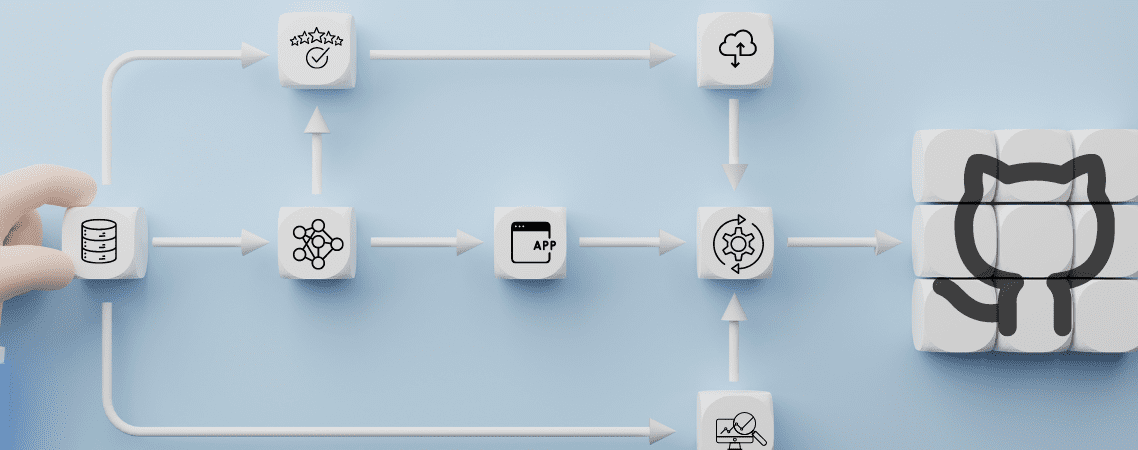10 GitHub Repositories to Master MLOps
Begin your MLOps journey with these comprehensive free resources available on GitHub.

Image by Author
It is becoming more important to master MLOps (Machine Learning Operations) for those who want to effectively deploy, monitor, and maintain their ML models in production. MLOps is a set of practices that aims to merge ML system development (Dev) and ML system operation (Ops). Luckily, the open-source community has created numerous resources to assist beginners in mastering these concepts and tools.
Here are ten GitHub repositories that are essential for anyone looking to master MLOps:
1. MLOps-Basics
GitHub Link: graviraja/MLOps-Basics
It is a 9-week study plan designed to help you master various concepts and tools related to Model Monitoring, Configurations, Data Versioning, Model Packaging, Docker, GitHub Actions, and AWS Cloud. You will learn how to build an end-to-end MLOps project, and each week will focus on a specific topic to help you achieve this goal.
2. MLOps examples by Microsoft
GitHub Link: microsoft/MLOps
The repository provides MLOps end-to-end examples & solutions. A collection of examples showing different end to end scenarios operationalizing ML workflows with Azure Machine Learning, integrated with GitHub and other Azure services such as Data Factory and DevOps.
3. Made-With-ML
GitHub Link: GokuMohandas/Made-With-ML
If you are looking for MLOps end-to-end examples and solutions, this repository has got you covered. It contains a diverse collection of scenarios that demonstrate how to operationalize ML workflows using Azure Machine Learning. Plus, it is integrated with other Azure services like Data Factory and DevOps, as well as GitHub.
4. Awesome MLOPs
GitHub Link: Pythondeveloper6/Awesome-MLOPS
The repository contains links to various free resources available online for MLOps. These resources include YouTube videos, career roadmaps, LinkedIn accounts to follow, books, blogs, free and paid courses, communities, projects, and tools. You can find almost everything related to MLOps in one place, so instead of searching online for various things, you can just visit the repository and learn.
5. MLOps Guide
GitHub Link: mlops-guide/mlops-guide.github.io
The repository will take you to a static site hosted on GitHub that will help projects and companies build a more reliable MLOps environment. It covers principles of MLOPs, implementation guides, and project workflow.
6. Awesome MLOps Tools
GitHub Link: kelvins/awesome-mlops
The repository contains a list of MLOps tools that can be used for AutoML, CI/CD for Machine Learning, Cron Job Monitoring, Data Catalog, Data Enrichment, Data Exploration, Data Management, Data Processing, Data Validation, Data Visualization, Drift Detection, Feature Engineering, Feature Store, Hyperparameter Tuning, Knowledge Sharing, Machine Learning Platform, Model Fairness and Privacy, Model Interpretability, Model Lifecycle, Model Serving, Model Testing & Validation, Optimization Tools, Simplification Tools, and Visual Analysis and Debugging.
7. MLOps by DTU
GitHub Link: SkafteNicki/dtu_mlops
This is a repository for the DTU course 02476, which includes exercises and additional materials for the machine learning operations course. The course spans three weeks and covers topics such as development practices, reproducibility, automation, cloud services, deployment, and advanced topics like monitoring and scaling for machine learning applications.
8. MLOps Course by Goku Mohandas
GitHub Link: GokuMohandas/mlops-course
The course focuses on teaching students how to design, develop, deploy, and iterate on production-grade ML applications using best practices, scaling ML workloads, integrating MLOps components, and creating CI/CD workflows for continuous improvement and seamless deployment.
9. MLOps ZoomCamp
GitHub Link: DataTalksClub/mlops-zoomcamp
One of my favorite courses for learning a new concept by building a project. The MLOps course from DataTalks.Club teaches the practical aspects of putting machine learning services into production, from training and experimentation to model deployment and monitoring. It is designed for data scientists, ML engineers, software engineers, and data engineers who are interested in learning how to operationalize machine learning workflows.
10. Serverless ML Course
GitHub Link: featurestoreorg/serverless-ml-course
This course focuses on developing complete Machine Learning systems with serverless capabilities. It allows developers to create predictive services without requiring expertise in Kubernetes or cloud computing. They can do so by writing Python programs and using serverless features, inference pipelines, feature stores, and model registries.
Conclusion
Mastering MLOps is essential for ensuring the reliability, scalability, and efficiency of machine learning projects in production. The repositories listed above offer a wealth of knowledge, practical examples, and essential tools to help you understand and apply MLOps principles effectively. Whether you're a beginner looking to get started or an experienced practitioner seeking to deepen your knowledge, these resources provide valuable insights and guidance on your journey to mastering MLOps.
Please check out the AI learning platform called Travis, which can help you master MLOps and its concepts faster. Travis generates explanations about the topic, and you can ask follow-up questions. Moreover, you can conduct your own research as it provides links to blogs and tutorials published by top publications on Medium, Substacks, independent blogs, official documentation, and books.
Abid Ali Awan (@1abidaliawan) is a certified data scientist professional who loves building machine learning models. Currently, he is focusing on content creation and writing technical blogs on machine learning and data science technologies. Abid holds a Master's degree in technology management and a bachelor's degree in telecommunication engineering. His vision is to build an AI product using a graph neural network for students struggling with mental illness.
